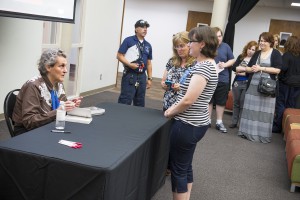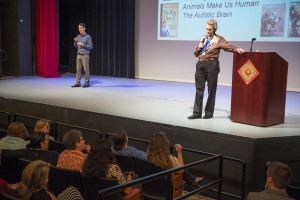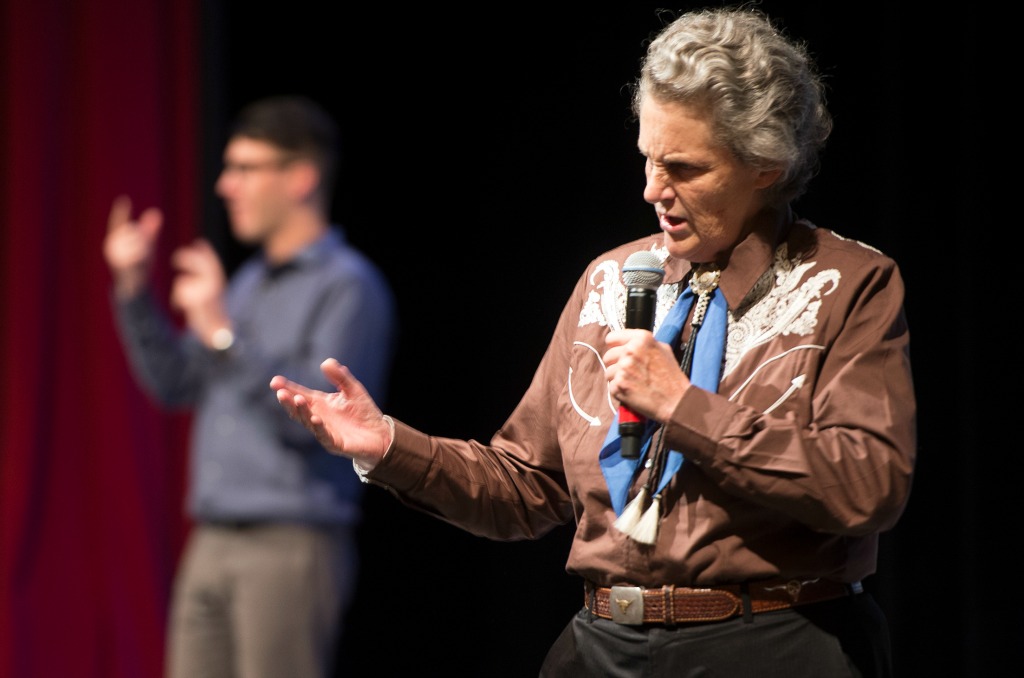When Temple Grandin visits NASA, Google, Microsoft and other high-tech companies, she sees the same types of people — adult versions of the kids she meets at autism events.
If those scientists and engineers and programmers had been kids today, she says, they probably would be labeled autistic — and society might miss out on their talents.
The problem, says Grandin, is that our society has gotten so busy labeling autistic kids that we’ve forgotten to play up their strengths.
“The thing that worries me today,” she told a packed house at Valencia’s East Campus, ” is that students are getting hung up on their autism label and they’re doing nothing with their lives. They’re in the basement playing video games.”
Now a professor of animal science at Colorado State University and best-selling author, Grandin didn’t talk until she was three and a half years old, communicating instead by screaming, peeping and humming. Diagnosed in 1950 with autism, she has become a prominent author and speaker on the subject of autism. She spoke at Valencia College’s East Campus on Nov. 5 and 6 as part of the college’s Humanities Speakers Series.
“I have read enough to know that there are still many parents, and yes, professionals too, who believe that ‘once autistic, always autistic.’ This dictum has meant sad and sorry lives for many children diagnosed, as I was in early life, as autistic. To these people, it is incomprehensible that the characteristics of autism can be modified and controlled. However, I feel strongly that I am living proof that they can,” she wrote in her book, “Emergence: Labeled Autistic.”
Although her father wanted to have her institutionalized, Grandin’s mother fought to integrate her daughter into every avenue of life. She hired a speech therapist to work with Temple as a child and sought out the best teachers for her.
Grandin’s mother was also determined to improve her daughter’s social skills. So when her mom threw parties, Temple became a junior hostess — and had to learn to shake hands with guests and greet them. Use every meal time to teach social skills and table manners, she says. If the child makes a mistake, tell him or her the correct way to do it instead of saying “no.” “When I licked a plate, I was told, ‘You are not a dog. Use a fork.’ ”
Grandin’s mother also arranged jobs for Temple — teaching her valuable work and life skills early. “A big problem today is that these kids are not learning work skills. When I was 13, my mom arranged a sewing job with a neighborhood seamstress. When I was 16, I was cleaning horse stalls and painting signs. When I was in college, I worked in a research lab,” she says. While working on her master’s degree, she painted signs — and landed a temporary gig painting signs for attractions at the Arizona State Fair. One of them? A sign for the “Himalayan Ice Mummy.” “It was,” she says now, “beyond stupid.” But it was work.
If it’s hard to find a job for your son or daughter, she advises creating one — or making use of the informal economy. Today, good work experiences for teenagers could be walking dogs, fixing computers, mowing lawns, making PowerPoint presentations, making greeting cards and selling them, or writing for a church or community newsletter.

To help kids who are different succeed, Grandin suggests that you must push them outside their comfort zones. When she was 15, her mom put her on a plane by herself and she flew from New York to Arizona, where she worked on her aunt’s ranch in the summer. “My mom gave me a choice: You can go for a week or you can go for the summer. Not going was not one of the choices,” she said.
There, on her aunt’s ranch, she discovered that she understood how cattle thought. That type of thinking — and experience — would pave the way for her career. She earned a degree in psychology and later became an expert in animal science, working as a consultant to companies with large animal slaughterhouse operations, advising them on ways of improving the quality of life of their cattle.
Autistic kids, she notes, have talents that aren’t being recognized in today’s cookie-cutter educational system. Beyond finding engineers and computer scientists, she says that autistic kids have talents in a wide variety of areas. “Where are the next generation of auto mechanics? Where are the industrial mechanics?” she asks. “They’re playing video games.”
An autism diagnosis isn’t precise, she says, and shouldn’t be used as an excuse to closet autistic people. “On one end of the spectrum, you’ve got Silicon Valley engineers and on the other end you’ve got people who can’t dress themselves.” But, she adds, there’s a lot in between. Some are visual thinkers, like Grandin, while others are pattern thinkers — the kind of people who excel at origami or make great computer programmers.
Mentors are critical for autistic kids. Mentors may be teachers, pastors, neighbors or someone who has retired from a field in which your child has interests.
And above all, she says, don’t let your kids become recluses.
Limit their TV or computer screen time to one hour a day — and instead encourage them to do something physical. Perhaps they could join 4-H or Future Farmers of America. Or she notes, subscribe to “Make” magazine and ignite a passion for building things. One of her new discoveries, she says, has been visiting “maker faires,” where geeks and artists work together to create all kinds of things — from robots operated with an iPad to giant creations made of cardboard boxes.
“When I was there, the kids weren’t playing with the iPod. They all wanted to play with the robot’s hand. Or the cardboard boxes,” she says.

The point, she says, is to expose kids to a lot of different activities, hobbies and challenges, so they can discover their own strengths. She discovered her own relationship with cattle — and her ability to understand how they think — by working on her aunt’s ranch. “I’m getting worried that schools are taking out a lot of hands-on stuff — we’re not exposing kids to a wide variety of activities,” says Grandin.
The musically-talented kid doesn’t know he’s talented unless he is exposed to music classes or gets to try playing an instrument, she says. And though kids may not succeed in some areas, at least they’ve been exposed to them. She, for instance, tried computer programming and was a miserable failure. “I could not learn it; it was a disaster,” she says. On the other hand, through the artwork she created, she learned that she’s a visual thinker.
And if you find your child’s passion, push him or her to stretch their boundaries. She has often said that, left to her own devices, she would have drawn horse heads nonstop as a young woman. But her mother pushed her to draw other things. If your child loves math, push him to do the most advanced math that he can. Build robots? Build big ones. Find resources online and let them learn — from Khan Academy and other online sites, from Udacity to Code Academy.
“Our best and brightest students should be out inventing things,” says Grandin. “The quirky kids today ought to be solving our energy problems — not playing video games in the basement.”
